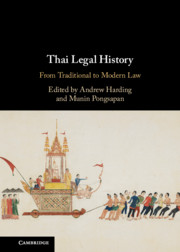Book contents
- Thai Legal History
- Additional material
- Thai Legal History
- Copyright page
- Contents
- Tables
- Contributors
- Preface
- Chronology
- Table of Cases
- Legislation, Constitutional Provisions, and Treaties
- Abbreviations
- 1 Introduction
- 2 Thai Legal History
- Part I Traditional Law and its Modern Resonances
- Part II Foreign Influence and the Reform Period
- 8 British Judges in the Supreme Court of Siam
- 9 The Fundamental Misconception in the Drafting of the Thai Civil and Commercial Code of 1925
- 10 The Modernisation of Thai Criminal Law
- 11 Thai Trust Law
- 12 The History of Thai Family Laws
- 13 The Origins of Thailand’s Bureaucratic State and the Consolidation of Administrative Justice
- 14 Siam and the Standard of Civilisation in the Nineteenth Century
- Part III Constitutional Conflicts 1932–2017
- Glossary
- Index
11 - Thai Trust Law
A Legal Import Rooted in Pragmatism
from Part II - Foreign Influence and the Reform Period
Published online by Cambridge University Press: 28 May 2021
- Thai Legal History
- Additional material
- Thai Legal History
- Copyright page
- Contents
- Tables
- Contributors
- Preface
- Chronology
- Table of Cases
- Legislation, Constitutional Provisions, and Treaties
- Abbreviations
- 1 Introduction
- 2 Thai Legal History
- Part I Traditional Law and its Modern Resonances
- Part II Foreign Influence and the Reform Period
- 8 British Judges in the Supreme Court of Siam
- 9 The Fundamental Misconception in the Drafting of the Thai Civil and Commercial Code of 1925
- 10 The Modernisation of Thai Criminal Law
- 11 Thai Trust Law
- 12 The History of Thai Family Laws
- 13 The Origins of Thailand’s Bureaucratic State and the Consolidation of Administrative Justice
- 14 Siam and the Standard of Civilisation in the Nineteenth Century
- Part III Constitutional Conflicts 1932–2017
- Glossary
- Index
Summary
The Thai Civil and Commercial Code expressly prohibits the creation of trusts except when provided for by specific legislation. To date, there is only one such piece of legislation: the Trust for Transactions in the Capital Market Act of 2007. However, the history of trusts in Thailand dates back to the late 19th century, and whilst the separation of legal and equitable titles does not sit well with the Code’s legal or intellectual framework, it is possible to provide a coherent explanation of its historical development through the lens of legal pragmatism.This chapter investigates the journey of trust law in Thailand, which runs in parallel with the country’s expansion of international trade and its industrial modernisation. It traces the historical judicial treatment of English common law trusts and the more modern regulatory attempt to integrate statutory trusts into the Thai legal system. Whilst both avenues demonstrate a highly adaptive and pragmatic approach to this imported equitable creature, they appeal to different legal and public policy considerations. With the Draft Bill on Trusts for the Purpose of Personal Asset Management having received cabinet approval in 2018, Thailand now stands at an important juncture for the development of its future trust law regime.
Keywords
- Type
- Chapter
- Information
- Thai Legal HistoryFrom Traditional to Modern Law, pp. 153 - 169Publisher: Cambridge University PressPrint publication year: 2021
- 1
- Cited by



